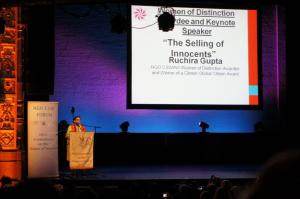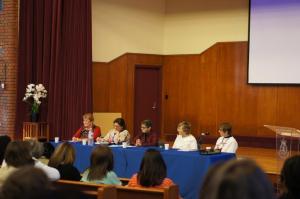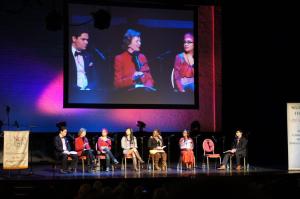Agreed Conclusions
Finally on Wednesday, just as I was about to leave wifi for a few days, the agreed conclusions were put up online by the UN CSW. But what do they mean for us and why are they important? Here’s a brief overview of what we need to take note of and, as you would expect, take action.
1. Firstly the agreed conclusions are not legally binding. Governments are tetchy about signing things at the UN that force them to do things. Indeed there was an ongoing battle at this CSW to ensure the removal of the term ‘sovereignty’ from the text which would mean that countries didn’t really have to implement the conclusions. This was strongly opposed, after all, if you agree by consensus why would you want a get out clause? The agreed conclusions do place a strong imperative on governments to implement the agreement, alongside the need to report back next year on actions taken to do just this.
2. The agreed conclusions give NGO’s and churches an opportunity to lobby their respective governments to put into action what they have signed up to do. It’s a great opportunity to see more action, funding, resources, political effort and will to end violence against women. NGO’s and churches can ask governments to indicate how they are implementing the required actions, and if not, to justify why certain things have not happened. I will be asking my MP, Dr Vince Cable, how the government will be implementing the conclusions. Will you do the same?
3. ‘Violence against women and girls is characterised by the use and abuse of power and control in public and private spheres, and is intrinsically linked to gender stereotypes…’ (point 10). This acknowledges what we know in that violence takes place in the home ( private sphere) and IS our business. It is not ‘just a domestic’, nor ‘none of my business’. Gone are the days when we think that what happens behind closed doors is nothing to do with us. It is our business. It is our church. We need to speak out. At a hard-nosed economic end it costs the British public billions of pounds a year to deal with domestic abuse. It costs us all economically, socially, spiritually and in many lost work hours.
4. Gender stereotypes are a cause and consequence of violence against women. Is it time to re-look and examine ourselves to see if we are perpetuating stereotypes of men and women? Do we make subtle remarks? Or obvious ones? Don McPherson challenged us all in the engaging men and boys workshop to not use phrases like ‘Throws like a girl’. He said this did two things; it created unhealthy competition between his son and daughter; and undermined the value of his daughter. Do we still make comments such as ‘woman driver’, ‘must be the time of the month’, ‘don’t be such a girl!’? Time to change the rhetoric.
5. In these agreed conclusions we see a reference to religious institutions. This is something I was lobbying for as part of the Church of England’s key messages. The Commission strongly condemned ‘invoking any custom, tradition or religious consideration to avoid their obligations’. This means we cannot justify violence against women and girls through our theology, scriptures and cultural practices. It means that we as a church, need to examine ourselves and see if anything we are doing directly or indirectly leads to violence against women. If we did this it could have wide reaching implications on the way we are as church, what we preach and teach to ensure that there is no misunderstanding nor misinterpretation of scripture that could lead to justifying violence. None of us would deliberately (mis)use scripture to coerce and manipulate right? I wish I could sit here and say a resounding yes to that. But I have listened to enough stories of Christian women both in the UK and overseas, that tell a different story. ‘I expect my wife to bow down before me as I bow down before Christ’ are the words of a rural Zimbabwean Pastor that will ring in my ears for years to come. Yes some of it is theological education and understanding the hermeneutics and exegesis of the Bible. Alongside this we have to remember and recall that the church is full of recovering sinners, addicted to sin. We are all at different points in our journey of faith, but we cannot allow abuse to happen along that journey. We need to challenge the abuse happening in our churches.
6. Under x its states ‘Prevent, investigate and punish acts of violence against women and girls that are perpetrated by people in positions of authority, such as teachers, religious leaders,…’ Here the governments are specifically asked not to give any special ‘get out of jail free cards’ to our vicars, curates, Bishops and Archbishops. When we see violence happen we need to take action, no matter how hard it may seem. There is a victim on the other end who needs our support, care and compassion. We need to be more victim and survivor centered in our approach and response to violence against women to avoid any collusion with a perpetrator of abuse.
7. Part B headlines ‘Addressing structural and underlying causes and risk factors so as to prevent violence against women and girls’ (VAWG). In here we see a host of action and reaffirmation of action to prevent VAWG including addressing ‘unequal power relations between men and women‘. This will no doubt ring alarm bells for some. The Church of England will need to look at this and see how it wants to take this forward. As we have seen at Synod, there are strong views on both sides about women bishops debate. Does this constitute a violence against women denying them a right to progress in their calling? Some would argue strongly that it does, others that this is not a violence but staying tune to Biblical teaching. One thing is for sure, we need to be aware of how unequal power relations can lead to violence and make steps to ensure that violence does not result from the decisions we make.
8. ‘Engage, educate, encourage and support men and boys to take responsibility for their behaviour‘ A focus of this CSW was women and men working together to end violence against women. Men talking to men, calling out violence, challenging themselves and their dominate cultural masculinities. So in our churches, Men’s breakfasts, Men’s work groups how are we going to open up the space to actively talk about masculinities (note plural) and it’s impact on our relationships at home, work, church etc.
9. ‘Recognise the role the media can play in eliminating gender stereotypes….and refraining from presenting them as inferior beings and exploiting them as sexual objects’. When I see this my mind goes straight to Page 3. How in 2013 do we still have a national newspaper legally allowed to objectify women on a daily basis in a paper that children are allowed to purchase? It does make me really angry that this is defended under the guise of free press. Will we join in the campaign to end page 3 or we will continue to be complicit in this objectification by our silence? I will continue to speak out on this one.
10. Point mm relates specifically to addressing and changing ‘attitudes, behaviours and practices that condone gender stereotypes … and violence against women and girls‘. This recognises the role that religious leaders can play in changing attitudes and behaviours. Getting religious leaders including in here is a victory as it acknowledges the positive role the church can, does and is playing in the UK and internationally in the Anglican Communion to bring violence to and end. Whether it is doing the simple thing of putting posters in the women’s toilets to access help, or going further and teaching and training on how to become a safe church, there is much we can share within the church on ending violence against women. The church is about positive change, about transformation, about new life, about freedom. Freedom for the survivor of violence and freedom for the perpetrator in being bound by believing abuse of power is better than love and grace. After all the church welcomes all, but don’t expect to leave the same.
You can read the full agreed conclusions here. They are not simply for governments to implement but for us too. After all we create our culture and our environment together. We can contribute to keeping it the same or challenge and change it. What do you want to do?



